A Philosophy Paper’s Part In A Title IX Lawsuit
A former undergraduate who majored in philosophy at Yale has filed a Title IX lawsuit against the university. The student, a male referred to as “John” in the lawsuit, is suing on grounds of hostile educational environment, sexual harassment, discrimination, retaliation, erroneous outcome, selective enforcement, 14th Amendment due process, equal protection,and declaratory judgment violations, and breach of contract. John had been the subject of a complaint by a fellow student, Jane, who alleged that he had raped her.
The entire 69-page lawsuit can be found here. Of particular interest may be the section of the lawsuit that details how John was allegedly treated by the university in regards to a philosophy paper that he wrote for a class. I reproduce the relevant pages below:
I remind readers that the foregoing what the plaintiff alleges happened. The entire complaint is here (via Leiter).

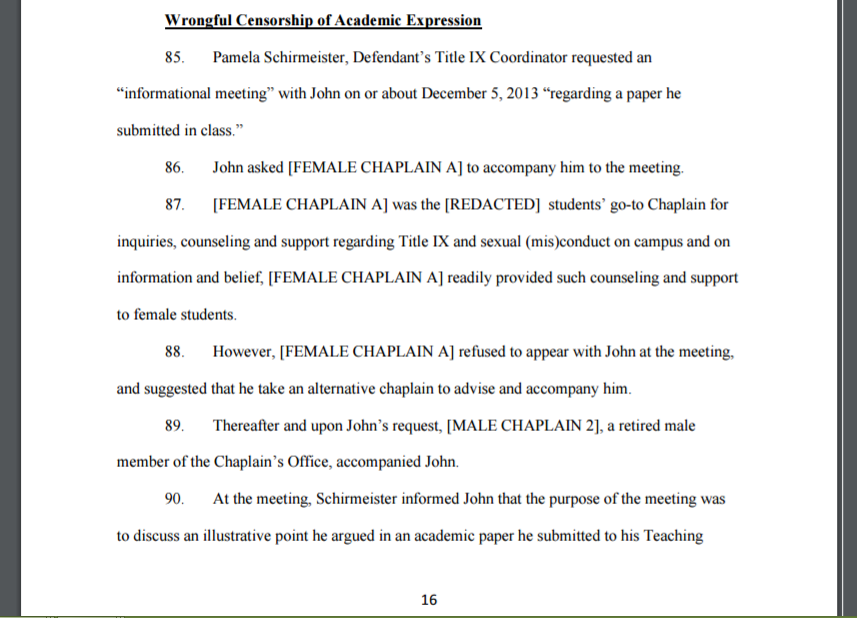

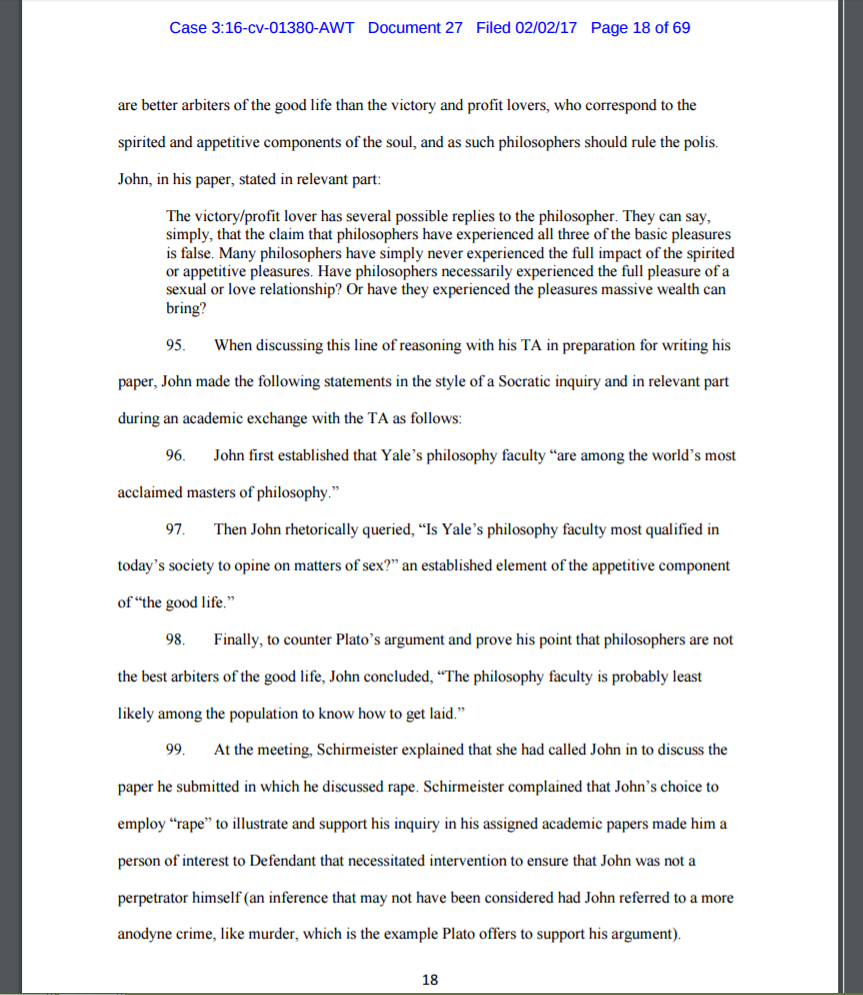
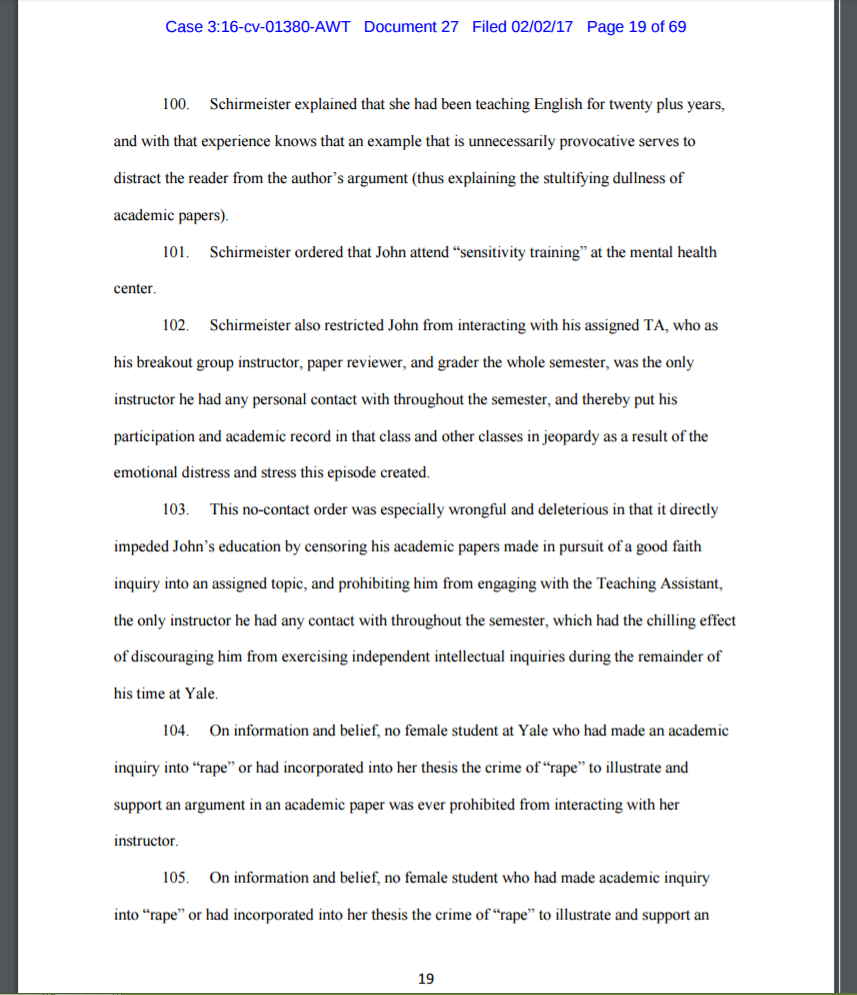
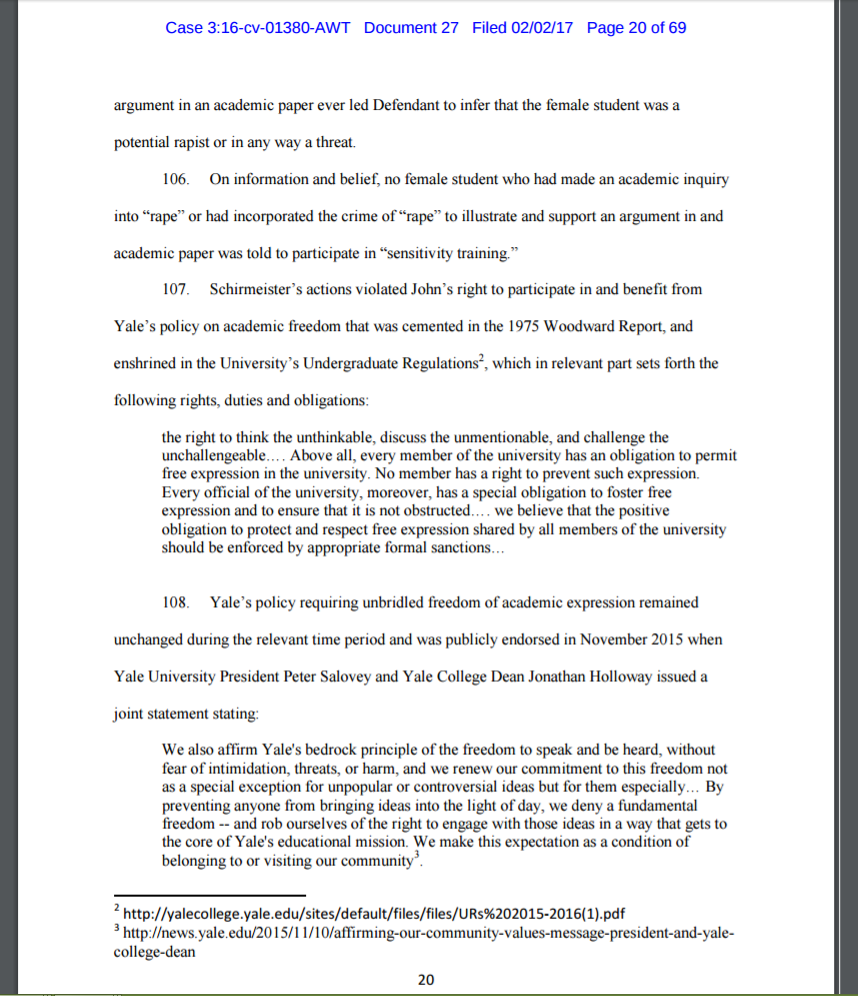
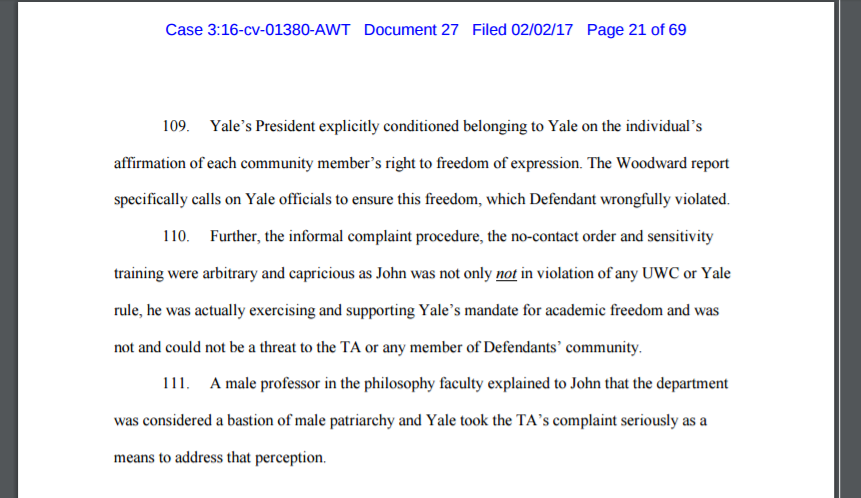

It seems clear that John was not using Plato’s philosophy to condone rape, but rather using the obvious evil of rape to object to Plato’s philosophy.
It seems a bit more complicated than just what the student intended to do in the Plato paper. First, I don’t think that the example he used wasn’t the most concerning part of that particular incident, but the comment about philosophy faculty being “least likely among the population to know how to get laid” is at best wildly inappropriate and should have been addressed as it was. Further, the summary of the lawsuit explains that the student was accused of two separate cases of sexual misconduct: one of forcible touching and restraint of a female student, and another of rape of another female student. The lawsuit does say that the incident with the philosophy paper happened before the accusations of sexual misconduct and that the accusations were recanted. However, it is incredibly common for victims of sexual violence to recant due to pressure by administration and peers, and rapists usually do have a pattern of aggressive behavior which may not have found its way into the lawsuit. We are only reading John’s side through the lawsuit. Whether or not his paper condoned rape, the language used might seem like aggressive behavior in combination with his behavior in class.
How is the comment “wildly inappropriate”? The student was attempting to provide a counter-example to his (mis)understanding of Plato’s argument, and no offense to Yale’s philosophy department, but the attempted counter-example doesn’t seem to me to be entirely off base, if overblown and rather vulgarly stated. Why think that the appropriate response to a crass rhetorical statement is to mandate “sensitivity training” at the mental health center and removing the student from contact with the TA? That’s outrageous, and any philosopher committed to free thought should be deeply troubled by this account.
To be completely honest, I don’t know how to explain why commenting on (or rather, insulting) the sexual lives of anyone, nonetheless a distinguished faculty in a respected institution, is inappropriate. It seems obvious to me that such a ‘crass rhetorical statement’ has no business in an undergraduate paper and borders on harassment. How is it not inappropriate (or, how is it appropriate) to comment on the sexual lives of others one does not know personally? And this probably isn’t the only reason he was removed from contact with the TA. There were likely other circumstances in making that decision, they’re just not detailed in the lawsuit, which is not an unbiased account of the events and doesn’t have to include the other reasons. We will have to see how the lawsuit goes.
“It seems obvious to me that such a ‘crass rhetorical statement’ has no business in an undergraduate paper”
It seems obvious to me too. But the usual academic remedy for statements that have no business in an undergraduate paper is a reduced grade, not disciplinary action. The latter, as a response to the statement in isolation, seems a fairly clear violation of free speech, though I take the point that as part of a more pervasive course of action it could be harassment, and that we’re unlikely to get an unbiased account from one side of a lawsuit.
It looks like I misread, and the comment was actually part of a verbal discussion with the TA about the argument. Thanks for the clarification. Still, I don’t think that sensitivity training was unwarranted. Given the other events detailed in the lawsuit (which is, again, a document of his own defense and so there is no reason to believe that they were unfairly characterized), it seems reasonable to believe that he behaved in ways to make others uncomfortable outside of this particular incident. While he might not have done so maliciously, sensitivity training could have been helpful to him so he could learn why others responded as they did. I think James Howard’s comment below is helpful for understanding why I think the sensitivity training was appropriate. However, it doesn’t seem that sensitivity training helped John much, in this case, seeing as accusations of sexual misconduct and this lawsuit have followed. It seems to me like he should have let the incident go and tried to move on.
Not that I’ve looked at anything beyond this post, but by my understanding the ‘crass rhetorical statement’ was not actually in a paper, but rather part of a verbal exchange with the TA. The reason I think this matters is that the difference in context seems like a plausible way to account for how appropriately (or inappropriately) the statement is received; a joke (or in this case, an exaggerated/crass stereotype) in one context is unprofessional (at best) or a hate-crime (at worst) in another. This merely being the manner in which John attempted to take up a particular issue with Plato is hardly grounds in and of itself to warrant full blown sensitivity training AND a restricted access to the only instructor interacting with the students. At worst his paper should have been returned with a comment about sensationalist examples and been docked half a letter grade.
Not to be obnoxiously diplomatic, but I think you all make good points. Kate is certainly right that the situation is more complicated. My point was narrow—it was only about the example in the paper. If I had been his professor, I would have done *something* to address its crassness and presentation, and also his apparently lacking grasp of Plato’s view. (Probably not sensitivity training, but perhaps docked points and a private conversation—that may be where we disagree.) Of course the allegations against the student are serious. But the paper *in itself* wouldn’t cause me to think him predatory.
You can’t even parody these people, episode 75948.
The student was trying to argue that philosophers haven’t experienced all three forms of pleasure. He also suggests that philosophers haven’t experienced the pleasures of great wealth, despite not knowing their bank balances. Would you describe this assertion as “wildly inappropriate” as well? Of course not. People are troubled by the mere mention of sexual desire (clearly Plato himself would be expelled due to his pervy example of Leontius).
We can all agree that the passages quoted don’t demonstrate incisive brilliance. But, as philosophers, we ought to respond to undergraduates by critiquing their arguments, not by sending hapless students to title IX administrators who respond to bad arguments by mandating reeducation/sensitivity training programs. Plato wept.
And an overly capacious characterization of harassment that would count an undergraduate’s attempt at coming up with a counter-example as “harassment” helps no one, especially not the many women in philosophy who are still regularly harassed (really harassed) by their male colleagues.
I doubt that this happened as alleged. If it did, it should not have.
It seems likely the female chaplain and TA had a justifiable reason to be afraid of the student and asked Yale to protect them. Most employers would act to reduce liability and Yale, beholden to Title IX, acted accordingly (for once).
The student may have employed nonverbal intimidation, which would weigh heavily in this case. It’s improbable that the chaplain and TA would subject themselves to the logistical hassles and inevitable ridicule if they weren’t genuinely threatened. It’s also improbable that Yale Title IX officials were cavalier in their decision to act, given their desire to improve their bad reputation. A preponderance of the evidence is required for Yale’s actions. Do we assume this was absent?
Also, this male student, in this appeal to Title IX, is apparently not subject to the same public hyper-scrutiny and disregard as women who do the same. We need to ask ourselves why.
*The student may have employed nonverbal intimidation
Yes, and he _may_ have also been a 9th Dan Tai Chi master too. This is, of course, wild conjecture.
* It’s improbable that the chaplain and TA would subject themselves to the logistical hassles and inevitable ridicule if they weren’t genuinely threatened.
This is simply untrue. People on the border-line, mean people, and ideologues fighting for the “greater good” will happily engage in “system abuse”. It’s just power play for them. This is prevalent in domestic abuse, with something like 15% of men experiencing “system abuse” by bully wives/partners. Yes, women _can_ be bullies. Bullying is equal opportunity like that.
I’m not going to defend this male student. He sounds like an idiot, and perhaps he was slapped down too hard. Or perhaps not. I don’t know.